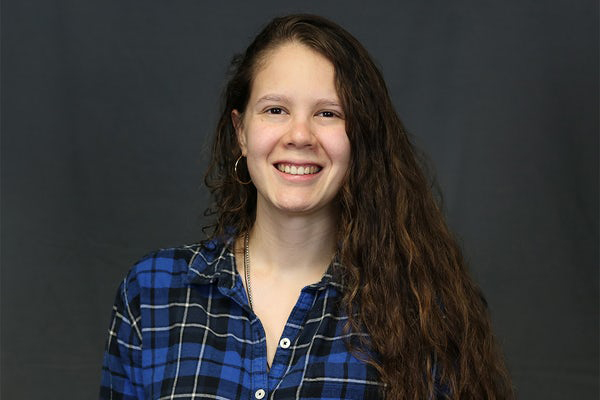Maria Bandres
Biomedical Engineering
Degree pursuing: PhD in biomedical engineering
Hometown: Maracay, Venezuela

Where did you complete your undergraduate degree?
Simón Bolívar University in Caracas, Venezuela
Please provide your lab and description of research.
I work in the Plasticity, Monoamines and Recovery of Function Laboratory (PMRF Lab), directed by Dr. Jacob McPherson. There, we explore the interrelation between the neural control of movement and pain processing after stroke and spinal cord injury. From my case, I am involved in the pre-clinical side of the lab, and I use in vivo electrophysiology and neural-computer interfaces to develop intraspinal stimulation approaches that simultaneously restore motor and sensory function after spinal cord injury.
What played into your decision to get a graduate engineering degree?
I decided to get a graduate degree because academia gives me the opportunity to do and be a part of things I love and am passionate about. For instance, I love learning interesting things, but I also strongly believe that proper education and the creation of new knowledge and technologies are paramount to improve people's quality of life. Moreover, I decided to get a degree in engineering because I wanted to produce new knowledge that directly addressed existing problems whose solutions would positively impact people's lives.
Why did you pick WashU?
To this, I like to say that WashU picked my mentor. Our lab joined WashU in 2019 when I was finishing the second year of my PhD at Florida International University (FIU) in Miami. I was extremely excited to join WashU, but also terrified (let's say that my impostor syndrome was having the best time of its life). However, I have felt nothing but welcomed and supported as a student and a scientist-trainee since I joined WashU. I know WashU takes a lot of pride in how friendly and collaborative its scientific community is, and after my time here, all I can say is that is 100 percent true.
What was your favorite course and why?
Since I was done with my course load when I joined WashU, I only had to take a few courses here. However, among those, my favorite is Molecular Basis of Bioelectrical Excitation instructed by Dr. Jianmin Cui. This course may have been one of the most challenging ones of my whole academic record, but also one of the most eye-opening and beautifully designed courses I have witnessed. In this graduate-level course, we explored the field of ion channels in chronological order implementing classic literature. For context, textbooks are summaries of what we already know, so one line in a textbook can be the result of decades of scientific research. Thus, in this course, we learned about ion channels by exploring the most significant literature and putting together the pieces from different papers to come out with that line in the textbook. For me, that course helped me realized how much work and people are needed to advance or even create a scientific field because at some point they were working in the dark and each new finding was a little piece of the whole picture. And, as a scientist-trainee, that was a very inspiring and humbling experience.
Who is your favorite instructor and why?
On this one, I will say, Dr. Rohit Pappu. It's important to mention that I have not been his student but his assistant in instruction in Bioengineering Thermodynamics. I worked with him in Fall 2020, when we were trying our best to start the academic year while keeping everyone safe from COVID.
He is very knowledgeable and excellent at instructing without a doubt. Nonetheless, what impacted me the most was how accommodating, welcoming and kind he was to his students. Moreover, he was fantastic at communicating with the students and considering their challenges and needs without sacrificing the level and expectations of the course.
I think his teaching style is a great example and inspiration for anyone who aspires to become a professor.
What advice would you give to a new student?
First, find caring mentors. Second, be aware of what you want and need from grad school, but also be prepared for those things to change over time. Third, make friends with the senior graduate students; it'll make your academic life so much easier (and they're usually great people to be friends with!). Fourth, don't listen to the impostor syndrome. You are here because you earned it. Lastly, grad school is a job, not your life. Take weekends off, have hobbies and take care of your physical and mental health.
What is your favorite thing about St. Louis?
It has the advantages of a big city (e.g., places to go, service, an airport, public transportation) while also having the advantages of a small city (e.g., affordable housing, short distances between places, friendly people).
What campus activities or groups would you recommend to a new student?
When we are safe to do so, there will be many coffee break hours and happy hours happening every week. The retreats are also great opportunities to get to know the students and faculty in a department or area of research.
Are there any not-for-profit agencies that you have volunteered or worked with?
Aqua Foundation for Women and PrideLines, both in Miami, Florida.
What are your plans for the future?
My long-term goal is to become a principal investigator and conduct research that focuses on neurorehabilitation in the context of women's health. However, my current goal is to become an excellent and competitive trainee, so I can move ahead in my academic career and eventually secure an ideal postdoctoral position.
